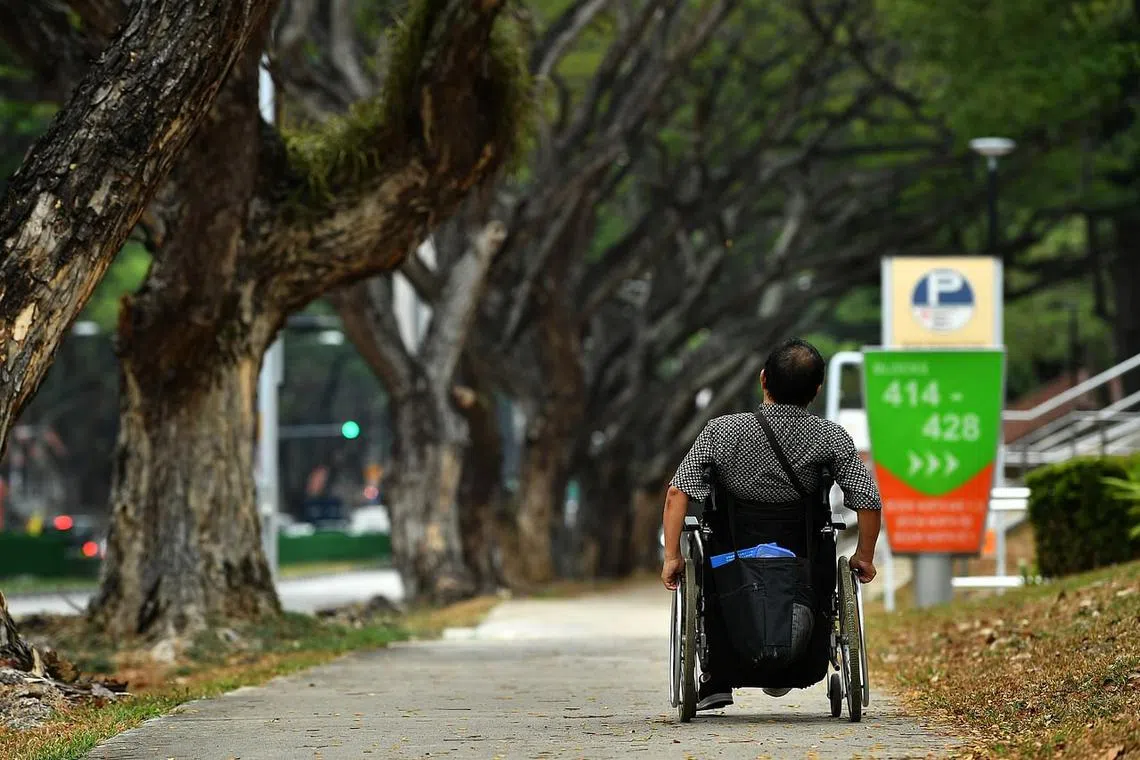More interest in hiring people with disabilities in sectors facing manpower crunch
Sign up now: Get ST's newsletters delivered to your inbox

The latest road map to support people with disabilities hopes to achieve 40 per cent employment for this group, placing another 10,000 people into jobs by 2030.
PHOTO: ST FILE
SINGAPORE – Organisations helping people with disabilities (PWDs) to secure work said there was more hiring interest among firms in the past months, with an increase of up to 30 per cent in inquiries following the release of the Enabling Masterplan 2030
Disability agency SG Enable said there has been greater interest generally in hiring people with disabilities in the last few years, with about 700 employers offering more than 2,000 jobs between April 2018 and July 2022.
The increase in hiring is still confined mostly to sectors such as hospitality and food and beverage (F&B) that are facing severe manpower shortages, while sectors such as tech, logistics and healthcare have only started opening up to hiring people with disabilities.
The latest road map to support people with disabilities hopes to achieve 40 per cent employment
Eighty-eight employers had their inclusive practices recognised with the Enabling Mark by SG Enable in 2021. The national accreditation was launched in October 2020 to encourage businesses to hire people with disabilities.
Ms Ang Li May, chief executive of PWD employment agency Bizlink, which trains and places those with moderate to severe disability in jobs, said the agency has seen a 20 per cent to 30 per cent rise in inquiries from hirers in the past six months to a year.
Sectors that face manpower shortages, such as F&B and retail, hire Bizlink trainees more readily, she said. Flexible work arrangements have also let some trainees take on jobs in data annotation, where they can work from home.
Mr Bryan Lim, director of residential and centre-based services at the Movement for the Intellectually Disabled of Singapore (Minds), said Minds has received about 10 per cent more inquiries from employers since April.
The number of companies working with Minds trainees increased from 32 in 2020 to 46 in 2022 as the F&B, retail, hotels and tourism industries reopened amid the Covid-19 pandemic. The number of Minds trainees who entered open employment – working in the same workplace as the able-bodied – also increased from eight in 2020 to 11 in 2022.
Mr Abhimanyau Pal, chief executive of SPD, which supports people with physical, sensory and learning disabilities, said hiring slowed at the height of the pandemic, with 127 job placements between April 2020 and March 2021 compared with 201 from April 2019 to March 2020.
But the job market started to recover in 2021 and is on an upward trend.
From April 2021 to March 2022, employers hired 139 people with disabilities, and the trend is appearing to continue, he said.
Its clients have taken up roles in operations, telemarketing, sales support and technology.
Like the other agencies, SPD observed the main industries hiring those with disabilities this year to be F&B, the public sector, retail and services, manufacturing and telemarketing, with the current job market favouring those who have experience with information technology and automation.
Sixty per cent of SPD clients were hired in managerial, professional, executive and other white-collar jobs while 40 per cent were hired in blue-collar positions in 2022, similar to 2021.
Those with intellectual disabilities or autism, who may need more accommodations, have a harder time getting jobs than people with physical disabilities, said Ms Ang.
Despite facing challenges with communication and flexibility, people with autism can be highly competent and capable of holding down a job, said observers.
Ms Jacelyn Lim, executive director of the Autism Resource Centre (ARC), said the centre has worked with 40 companies since 2012 and found jobs for close to 400 clients.
It places about 50 to 60 clients in jobs every year. Many have held their jobs for more than five years.
She added that apart from F&B and hospitality, growth sectors such as IT, logistics and healthcare are now hiring ARC’s clients, with placements in more skilled jobs, including digitisation work, software testing, data reporting, lab testing and cyber security.
Employers, on their part, must be willing to redesign work processes, with the understanding that people with autism work best in structured environments with clear tasks and goals, she said.
ARC’s job coaches prepare people with autism for the workplace by making instructions explicit and visual, as well as setting up workplace structures to have a clear workflow.
Those of Bizlink’s clients who are unable to take on open employment can sometimes get projects or assignments, which they do under the guidance of job coaches at the centre.
Minds is also looking at alternative forms of supported employment in 2023, such as getting employers to engage Minds workers but allowing them to work from Minds’ facilities, which the workers are more familiar with.
About 1 per cent of Minds’ trainees, or about 10 in 1,000 trainees, have moved into open employment in three labour-intensive sectors facing a manpower crunch – F&B, logistics and environmental sanitation.
Beyond routine work like sorting and packing, Minds trains its workers in baking, gardening and other types of jobs, said Mr Lim.


